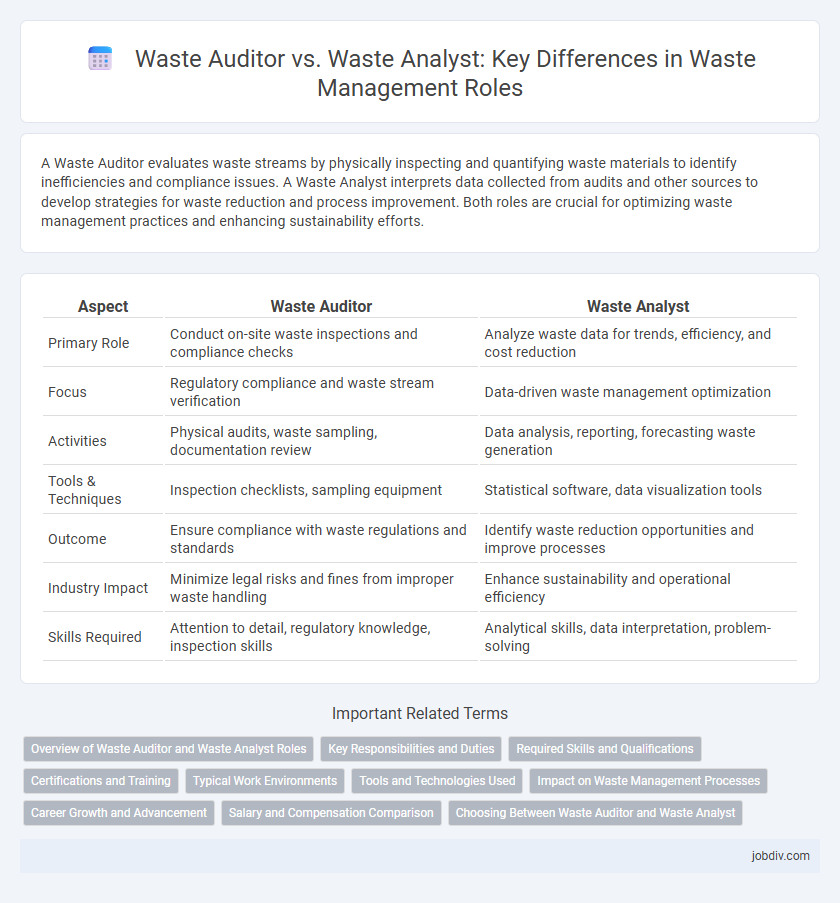A Waste Auditor evaluates waste streams by physically inspecting and quantifying waste materials to identify inefficiencies and compliance issues. A Waste Analyst interprets data collected from audits and other sources to develop strategies for waste reduction and process improvement. Both roles are crucial for optimizing waste management practices and enhancing sustainability efforts.
Table of Comparison
| Aspect | Waste Auditor | Waste Analyst |
|---|---|---|
| Primary Role | Conduct on-site waste inspections and compliance checks | Analyze waste data for trends, efficiency, and cost reduction |
| Focus | Regulatory compliance and waste stream verification | Data-driven waste management optimization |
| Activities | Physical audits, waste sampling, documentation review | Data analysis, reporting, forecasting waste generation |
| Tools & Techniques | Inspection checklists, sampling equipment | Statistical software, data visualization tools |
| Outcome | Ensure compliance with waste regulations and standards | Identify waste reduction opportunities and improve processes |
| Industry Impact | Minimize legal risks and fines from improper waste handling | Enhance sustainability and operational efficiency |
| Skills Required | Attention to detail, regulatory knowledge, inspection skills | Analytical skills, data interpretation, problem-solving |
Overview of Waste Auditor and Waste Analyst Roles
Waste Auditors evaluate waste management systems by conducting thorough inspections and assessments to identify inefficiencies and compliance issues in waste handling processes. Waste Analysts focus on collecting and analyzing waste data to interpret trends, forecast waste generation, and recommend improvements based on quantitative insights. Both roles aim to enhance sustainability and cost-effectiveness in waste management operations through specialized expertise in auditing and data analysis.
Key Responsibilities and Duties
A Waste Auditor primarily focuses on inspecting waste streams to identify types and quantities of waste, ensuring compliance with environmental regulations, and recommending waste reduction practices. In contrast, a Waste Analyst evaluates data related to waste generation, disposal costs, and recycling efficiency to optimize waste management strategies and improve sustainability outcomes. Both roles collaborate to enhance waste diversion efforts and support environmental compliance through detailed assessments and data-driven insights.
Required Skills and Qualifications
A Waste Auditor requires expertise in data collection, regulatory compliance, and waste stream analysis, often holding certifications such as Certified Waste Auditor or Environmental Science degrees. A Waste Analyst needs strong skills in data interpretation, statistical analysis, and reporting, typically possessing backgrounds in environmental engineering, data analytics, or sustainability studies. Both roles demand proficiency in waste management software, knowledge of local and federal waste regulations, and the ability to recommend optimization strategies based on quantitative assessments.
Certifications and Training
Waste Auditors typically hold certifications like the Certified Waste Auditor (CWA) or Certified Environmental Auditor (CEA), emphasizing hands-on expertise in conducting waste assessments and compliance reviews. Waste Analysts often pursue training in data analysis and environmental management systems, with certifications such as the Lean Six Sigma Green Belt or Certified Waste Management Professional (CWMP) to enhance their skills in interpreting waste data and optimizing waste reduction strategies. Both roles require continuous education in environmental regulations and sustainability practices to maintain proficiency and adapt to evolving industry standards.
Typical Work Environments
Waste auditors typically work on-site at manufacturing plants, construction sites, or waste management facilities to assess waste streams and ensure compliance with environmental regulations. Waste analysts primarily operate in office settings, utilizing data analytics software to evaluate waste generation patterns and recommend process improvements for sustainability. Both roles collaborate with environmental engineers and regulatory agencies but differ in their emphasis on fieldwork versus data analysis.
Tools and Technologies Used
Waste auditors primarily use measurement tools such as scales, volume converters, and waste characterization software to quantify and categorize waste streams accurately. Waste analysts rely on data analytics platforms, Geographic Information Systems (GIS), and predictive modeling software to assess waste patterns and optimize waste management strategies. Both roles incorporate mobile applications and IoT sensors for real-time waste tracking and reporting.
Impact on Waste Management Processes
Waste Auditors critically assess waste streams to identify inefficiencies and verify compliance, directly influencing waste reduction strategies and regulatory adherence. Waste Analysts interpret data trends related to waste generation, disposal, and recycling, enabling informed decision-making for optimizing waste management systems. Both roles contribute significantly to enhancing sustainability and cost-effectiveness in waste management processes through targeted analysis and actionable insights.
Career Growth and Advancement
Waste auditors focus on analyzing waste management processes to identify inefficiencies and compliance issues, making their skills essential for companies aiming to reduce costs and environmental impact. Waste analysts interpret data trends and develop strategies for waste reduction, often advancing to roles in environmental consulting or sustainability management. Career growth for both roles depends on expertise in regulatory standards, data analysis, and sustainability practices, with waste analysts typically progressing faster into strategic planning and leadership positions.
Salary and Compensation Comparison
Waste Auditors typically earn an average salary ranging from $50,000 to $70,000 annually, reflecting their responsibility in evaluating waste management systems and ensuring regulatory compliance. Waste Analysts often command higher compensation, averaging between $65,000 and $85,000 per year, due to their role in data analysis, forecasting, and strategy development for waste reduction. Salary variations depend on factors such as industry, geographic location, and level of expertise within environmental management sectors.
Choosing Between Waste Auditor and Waste Analyst
Choosing between a Waste Auditor and a Waste Analyst depends on the specific needs of your waste management strategy. A Waste Auditor specializes in assessing current waste streams and identifying inefficiencies through on-site inspections and waste characterization, providing actionable insights for immediate waste reduction. In contrast, a Waste Analyst focuses on interpreting waste data, trend analysis, and forecasting to support long-term planning and policy development, making them ideal for organizations aiming to optimize sustainability goals through data-driven decisions.
Waste Auditor vs Waste Analyst Infographic

 jobdiv.com
jobdiv.com